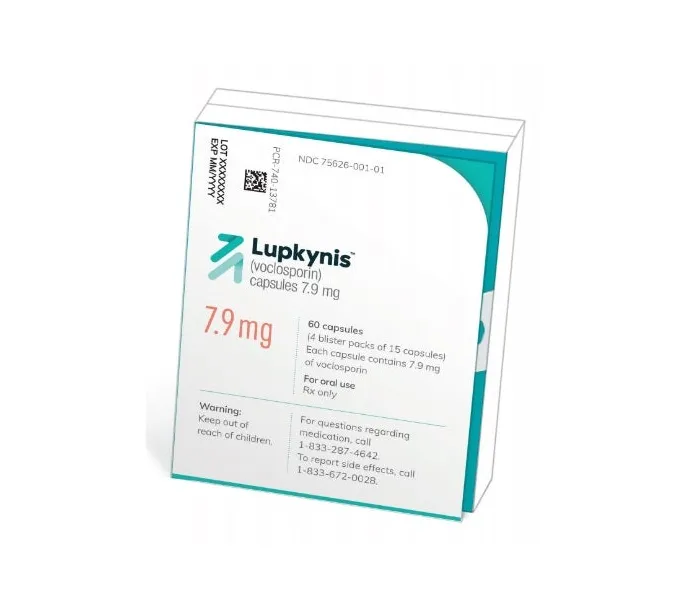Comprehensive Guide to Voclosporin: Uses, Dosage, Side Effects, and More
1. What is Voclosporin?
2. Overview of Voclosporin
Generic Name
Voclosporin
Brand Name
Lupkynis, generics
Drug Group
Calcineurin inhibitor (immunosuppressant)
Commonly Used For
This medication is used to:
- Treat lupus nephritis.
- Manage autoimmune kidney inflammation.
- Support immunosuppressive therapy.
Key Characteristics
- Form: Oral capsules (7.9 mg) (detailed in Dosage section).
- Mechanism: Inhibits calcineurin, reducing interleukin-2 production and T-cell proliferation.
- Approval: FDA-approved (2021 for Lupkynis) and EMA-approved for lupus nephritis.

3. Indications and Uses of Voclosporin
Voclosporin is indicated for autoimmune and inflammatory conditions, leveraging its immunosuppressive properties:
- Lupus Nephritis: Treats active lupus nephritis (Class III or IV) in adults, combined with mycophenolate mofetil and corticosteroids, reducing proteinuria and preserving kidney function, supported by the AURORA 1 and AURORA 2 trials.
- Systemic Lupus Erythematosus (SLE): Manages systemic manifestations of SLE with renal involvement, improving overall disease activity, per rheumatology guidelines.
- Membranous Nephropathy: Investigated off-label for primary membranous nephropathy, reducing proteinuria in resistant cases, with nephrology research data.
- Focal Segmental Glomerulosclerosis (FSGS): Explored off-label to control proteinuria in FSGS, enhancing remission rates, supported by kidney disease studies.
- Autoimmune Hepatitis: Used off-label to manage severe autoimmune hepatitis unresponsive to standard therapy, improving liver function, with hepatology evidence.
- Rheumatoid Arthritis (RA) with Renal Complications: Investigated off-label for RA patients with kidney involvement, reducing joint inflammation and proteinuria, noted in rheumatology cohorts.
- Chronic Graft-versus-Host Disease (cGVHD): Employed off-label post-transplant to manage cGVHD, controlling immune responses, with transplant medicine data.
- Uveitis: Explored off-label for non-infectious uveitis with renal implications, reducing ocular inflammation, supported by ophthalmologic research.
- IgA Nephropathy: Investigated off-label to slow progression in IgA nephropathy, stabilizing kidney function, with emerging nephrology evidence.
Note: This drug requires close monitoring of kidney function and blood pressure; consult a healthcare provider for tailored therapy.
4. Dosage of Voclosporin
Important Note: The dosage of this calcineurin inhibitor must be prescribed by a healthcare provider. Dosing varies by indication and patient response, with adjustments based on clinical evaluation.
Dosage for Adults
- Lupus Nephritis:
- Initial: 23.7 mg (three 7.9 mg capsules) twice daily (total 47.4 mg/day) with mycophenolate mofetil and corticosteroids.
- Maintenance: Continue 23.7 mg twice daily, adjusted after 6 months based on renal response.
- With Corticosteroids:
- Taper steroids per protocol (e.g., prednisone 0.5–1 mg/kg/day initially, reduced over weeks).
Dosage for Children
- Lupus Nephritis (12–17 years, off-label):
- 23.7 mg twice daily, adjusted for weight (>30 kg) and tolerance, under pediatric nephrologist supervision.
- Not recommended under 12 years.
Dosage for Pregnant Women
- Pregnancy Category C: Limited data; use only if benefits outweigh risks. Consult an obstetrician, with fetal and renal monitoring.
Dosage Adjustments
- Renal Impairment: Reduce to 15.8 mg twice daily if eGFR <60 mL/min/1.73 m²; avoid if <30 mL/min/1.73 m².
- Hepatic Impairment:
- Mild (Child-Pugh A): No adjustment; moderate (Child-Pugh B): 15.8 mg twice daily; severe (Child-Pugh C): Avoid.
- Elderly: Start with 15.8 mg twice daily; increase to 23.7 mg if tolerated.
- Concomitant Medications: Adjust if combined with CYP3A4 inhibitors/inducers (e.g., ketoconazole, rifampin), altering levels.
Additional Considerations
- Take this active ingredient twice daily with or without food, using water.
- Monitor blood levels (target trough 10–20 ng/mL) for therapeutic efficacy.
5. How to Use Voclosporin
- Administration:
- Swallow capsules whole with a glass of water, with or without food; avoid grapefruit juice.
- Take at the same time daily, consistently with other immunosuppressants.
- Timing: Use twice daily (e.g., morning and evening), maintaining regularity.
- Monitoring: Watch for swelling, high blood pressure, or signs of kidney issues (e.g., reduced urine output).
- Additional Tips:
- Store at 20–25°C (68–77°F), protecting from moisture.
- Keep out of reach of children due to toxicity risk.
- Report severe headache, vision changes, or signs of infection immediately.
6. Contraindications for Voclosporin
This drug is contraindicated in:
- Hypersensitivity: Patients with a known allergy to Voclosporin or calcineurin inhibitors.
- Severe Renal Impairment: Contraindicated if eGFR <30 mL/min/1.73 m².
- Uncontrolled Hypertension: Avoid due to exacerbation risk.
- Concurrent Use with Strong CYP3A4 Inhibitors: Contraindicated with drugs like itraconazole.
7. Warnings & Precautions for Voclosporin
General Warnings
- Nephrotoxicity: Risk of acute kidney injury; monitor eGFR and serum creatinine regularly.
- Hypertension: May worsen blood pressure; check BP weekly initially.
- Infections: Increased risk due to immunosuppression; prophylaxis may be needed.
- Malignancies: Higher risk of skin cancer or lymphoma; advise sun protection.
- Hyperkalemia: Risk of elevated potassium; monitor electrolytes.
Additional Warnings
- Neurotoxicity: Rare tremors or seizures; report neurological symptoms.
- Gingival Hyperplasia: Gum overgrowth with long-term use; maintain oral hygiene.
- Thrombotic Microangiopathy: Rare risk; monitor for hemolysis or thrombocytopenia.
- Lipid Abnormalities: May increase cholesterol; assess lipid profiles.
- Hypersensitivity Reactions: Rare anaphylaxis; discontinue if swelling occurs.
Use in Specific Populations
- Pregnancy: Category C; use only if essential with fetal monitoring.
- Breastfeeding: Excreted in breast milk; monitor infant for effects.
- Elderly: Higher risk of toxicity; start with lower doses.
- Children: Limited to 12+ years off-label; supervise closely.
- Renal/Hepatic Impairment: Adjust dose; avoid in severe cases.
Additional Precautions
- Inform your doctor about kidney disease, hypertension, or medication history before starting this medication.
- Avoid abrupt cessation; taper if discontinuing long-term use.
8. Overdose and Management of Voclosporin
Overdose Symptoms
Overdose may cause:
- Headache, nausea, or hypertension.
- Severe cases: Kidney failure, seizures, or hyperkalemia.
- Dizziness, swelling, or fatigue as early signs.
- Cardiac arrhythmias with extremely high doses.
Immediate Actions
- Contact the Medical Team: Seek immediate medical help.
- Supportive Care: Administer IV fluids, monitor vital signs, and correct electrolytes.
- Specific Treatment: Use hemodialysis if renal failure occurs; no specific antidote.
- Monitor: Check kidney function, blood pressure, and potassium levels for 24–48 hours.
Additional Notes
- Overdose risk is low; store securely.
- Report persistent symptoms (e.g., severe swelling, confusion) promptly.
9. Side Effects of Voclosporin
Common Side Effects
- Hypertension (15–25%, managed with antihypertensives)
- Diarrhea (10–20%, transient)
- Headache (8–15%, relieved with rest)
- Nausea (5–12%, reduced with food)
- Fatigue (4–10%, decreases with tolerance)
These effects may subside with dose adjustment.
Serious Side Effects
Seek immediate medical attention for:
- Renal: Acute kidney injury, proteinuria, or nephrotic syndrome.
- Cardiovascular: Severe hypertension or heart failure.
- Metabolic: Hyperkalemia, hypomagnesemia, or hyperglycemia.
- Infectious: Opportunistic infections or sepsis.
- Allergic: Rash, angioedema, or anaphylaxis.
Additional Notes
- Regular monitoring for kidney function, blood pressure, and electrolyte balance is advised.
- Report any unusual symptoms (e.g., swelling, severe fatigue) immediately to a healthcare provider.
10. Drug Interactions with Voclosporin
This active ingredient may interact with:
- CYP3A4 Inhibitors: Increases levels (e.g., ketoconazole); reduce dose to 15.8 mg twice daily.
- CYP3A4 Inducers: Decreases levels (e.g., rifampin); monitor efficacy.
- Statins: Enhances myopathy risk (e.g., atorvastatin); use alternatives.
- Antihypertensives: Potentiates hypotension; adjust dose.
- Immunosuppressants: Increases toxicity (e.g., tacrolimus); monitor levels.
Action: Provide your healthcare provider with a complete list of medications.
11. Patient Education or Lifestyle
- Medication Adherence: Take this calcineurin inhibitor as prescribed to manage lupus nephritis, following the exact schedule.
- Monitoring: Report swelling, high blood pressure, or reduced urine output immediately.
- Lifestyle: Limit salt intake; avoid excessive sun exposure.
- Diet: Take with or without food; avoid grapefruit juice.
- Emergency Awareness: Know signs of kidney failure or infection; seek care if present.
- Follow-Up: Schedule regular check-ups every 1–3 months to monitor kidney function, blood pressure, and drug levels.
12. Pharmacokinetics of Voclosporin
- Absorption: Well-absorbed orally (peak at 1.5–2 hours); enhanced with food, reduced by grapefruit juice.
- Distribution: Volume of distribution ~86 L; 97% protein-bound.
- Metabolism: Hepatic via CYP3A4 to inactive metabolites.
- Excretion: Primarily biliary (93%) as metabolites; renal (1.6%); half-life 28 hours.
- Half-Life: 28 hours, with sustained immunosuppressive effect.
13. Pharmacodynamics of Voclosporin
This drug exerts its effects by:
- Inhibiting calcineurin phosphatase, blocking T-cell activation and cytokine production.
- Reducing inflammation and immune-mediated kidney damage in lupus nephritis.
- Demonstrating dose-dependent nephrotoxicity and hypertension risks.
- Exhibiting synergistic effects with mycophenolate and corticosteroids.
14. Storage of Voclosporin
- Temperature: Store at 20–25°C (68–77°F); protect from moisture.
- Protection: Keep in original container, away from light.
- Safety: Store in a locked container out of reach of children due to toxicity risk.
- Disposal: Dispose of unused capsules per local regulations or consult a pharmacist.
15. Frequently Asked Questions (FAQs)
Q: What does Voclosporin treat?
A: This medication treats lupus nephritis.
Q: Can this active ingredient cause high blood pressure?
A: Yes, hypertension may occur; monitor regularly.
Q: Is Voclosporin safe for children?
A: Yes, for 12+ years off-label with a doctor’s guidance.
Q: How is this drug taken?
A: Orally as capsules twice daily, as directed.
Q: How long is Voclosporin treatment?
A: Long-term for lupus nephritis with monitoring.
Q: Can I use Voclosporin if pregnant?
A: Yes, with caution; consult a doctor.
16. Regulatory Information
This medication is approved by:
- U.S. Food and Drug Administration (FDA): Approved in 2021 (Lupkynis) for lupus nephritis.
- European Medicines Agency (EMA): Approved for lupus nephritis management.
- Other Agencies: Approved globally for autoimmune kidney disease; consult local guidelines.
17. References
- U.S. Food and Drug Administration (FDA). (2023). Lupkynis (Voclosporin) Prescribing Information.
- Official FDA documentation detailing the drug’s approved uses, dosage, and safety.
- European Medicines Agency (EMA). (2023). Voclosporin Summary of Product Characteristics.
- EMA’s comprehensive information on the medication’s indications and precautions in Europe.
- National Institutes of Health (NIH). (2023). Voclosporin: MedlinePlus Drug Information.
- NIH resource providing detailed information on the drug’s uses, side effects, and precautions.
- World Health Organization (WHO). (2023). WHO Guidelines on Lupus Management: Voclosporin.
- WHO’s recommendations for Voclosporin in autoimmune diseases.
- Journal of the American Society of Nephrology. (2022). Voclosporin in Lupus Nephritis.
- Peer-reviewed article on Voclosporin efficacy (note: access may require a subscription).
